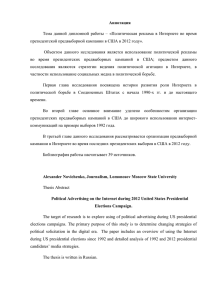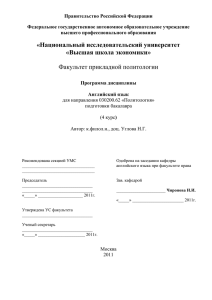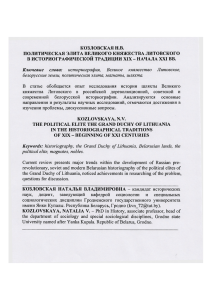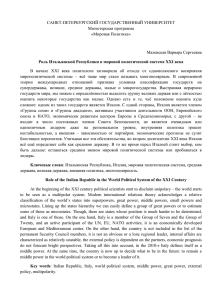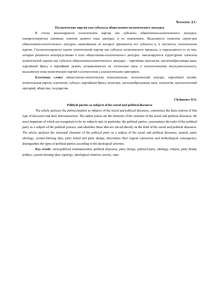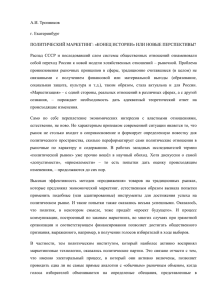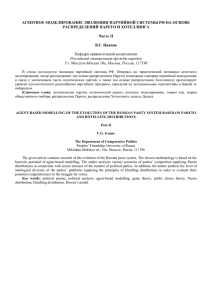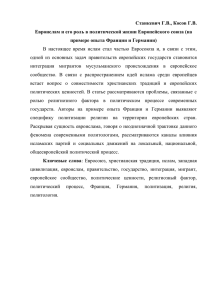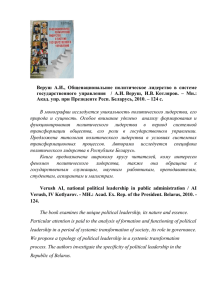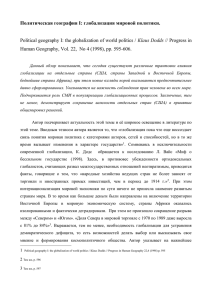Новый лексико-ориентированный учебный курс английского языка
реклама
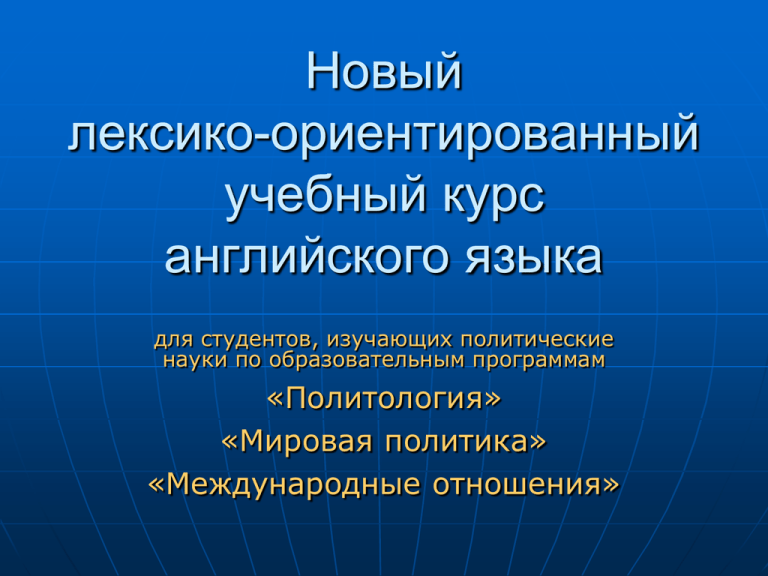
Новый лексико-ориентированный учебный курс английского языка для студентов, изучающих политические науки по образовательным программам «Политология» «Мировая политика» «Международные отношения» Vocabulary for Political Science Students поможет овладеть лексикой, необходимой для: Чтения печатных изданий Изучения специальной литературы по политологии и международным отношениям Использования Интернетресурсов Vocabulary for Political Science Students содержит 70 разделов, в которых представлены лексические единицы, репрезентирующие наиболее распространенные и коммуникативно востребованные концепты, образующие концептосферу «Политика» Современный лексический материал, тематически организованный и представленный в характерном для его употребления политическом контексте Introduction to Politics What is Politics Defining Policy The State, Statehood and Sovereignty Regimes Government Political Ideologies (1) Political Ideologies (2) Democracy Types of Democracy Liberal Democracy Transition to Democracy World Politics The Changing World Order (1) The Changing World Order (2) Interpreting World Politics (1) Interpreting World Politics (2) Globalization (1) Globalization (2) Is Globalization a Blessing or a Curse? Regionalization Political Economy Economy and Economic Difficulties Haves and Have Nots Protectionism and Commercial Liberalism Media and Politics Freedom of the Press Censorship Political Correctness Elections Electoral Law Elections: Who Can Vote Characteristics of Elections Election Campaigns and Campaigning Polls and Polling Assisting and Monitoring Elections Difficulties with Elections Political Parties Political Parties (1) Political Parties (2) Political Parties and Government Political Machinery Constitution The Judiciary Legislatures Parliamentary Systems Presidential Systems Bureaucracy The Military and Politics War and Peace Conflict vs Peace Armed Conflicts (1) Armed Conflicts (2) Armed Conflicts (3) Informal Armed Conflicts Security Peacemaking as a Diplomatic Effort Negotiations Coercive Diplomacy Nuclear Weapons Arms Control and Disarmament Challenges of the Modern World Nationalism The Grim Face of Nationalism Terrorism Climate Change and its Political Dimension Energy Security Addressing Challenges of the Modern World: the UN Corruption in Politics (1) Corruption in Politics (2) Fighting Corruption Appendix Studying Politics Talking about Problems and Difficulties Negotiations: Being at Loggerheads Negotiations: Working towards Agreement Abbreviations and Acronyms Agenda, Resolutions, Sanctions Debating, Writing an Analytical Paper Campaign Methods Electoral Process Каждый раздел учебного курса включает: Презентацию словаря Презентацию лексических единиц Типичные контексты употребления лексических единиц Комплекс заданий и упражнений Способствующий усвоению представленного словаря Обучающий использовать словарь в устной и письменной речи Четкие и простые пояснения, помогающие понять значение политических терминов The state is a political association that establishes sovereign jurisdiction within territorial borders, and exercises authority through a set of permanent institutions. (Heywood, 2000, p.39) The term “state” should be distinguished from the terms “nation” and “country”: “country” denotes a geographical area; “nation” denotes a people who are believed to share common customs, origins, and history; “state” refers to the set of governing institutions that has sovereignty over a definite territory. Наиболее частотные лексические единицы, их типичные сочетания, синонимы, антонимы Some phrases used to talk about sovereignty a claim to sovereignty a declaration of sovereignty a loss of sovereignty a handover/ transfer of sovereignty a violation of sovereignty Examples: The Spanish foreign minister said his country would never cede/ drop/ relinquish/ renounce/ withdraw its sovereignty claim over Gibraltar. Israel reacted angrily to a European Union statement challenging the country's claim to sovereignty over Jerusalem. In 2004, Russia was insisting on the earliest possible handover/transfer of sovereignty to the Iraqi government. Справочные разделы по грамматике с объяснениями грамматических особенностей употребления политической лексики Grammar Tip The noun poll has different meanings. As a countable noun a poll means “public opinion survey”. Political polls have become increasingly popular. Used in the singular with the definite article, the poll means “the total number of votes in an election or referendum”. Wilson came away with 64% of the poll. Used in the plural with the definite article, the polls usually refers to “the process of voting”. The Socialist party candidate was defeated at the polls. Большое количество тренировочных упражнений и заданий, построенных на аутентичном материале и направленных на: прочное усвоение лексических единиц и норм их сочетаемости, употребление синонимов, антонимов, производных активное использование нового словаря в устной и письменной речи формирование и развитие коммуникативных умений, необходимых для устного и письменного общения в сфере внешней и внутренней политики Индексный указатель ключевых лексических единиц позволяет быстро найти разделы, в которых представлены не только искомые лексические единицы, но и лексические единицы, семантически связанные с ними Варианты ответов к тренировочным упражнениям предоставляют дополнительную информацию позволяют использовать данный курс как в аудитории, так и для самостоятельной работы
